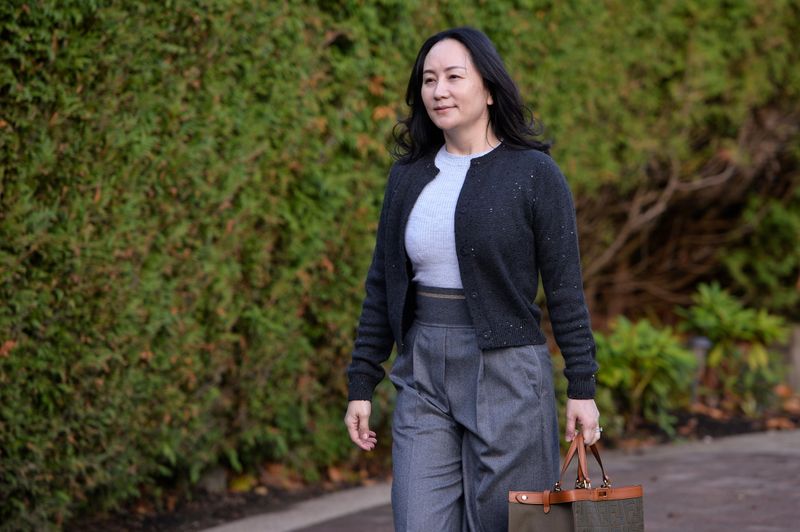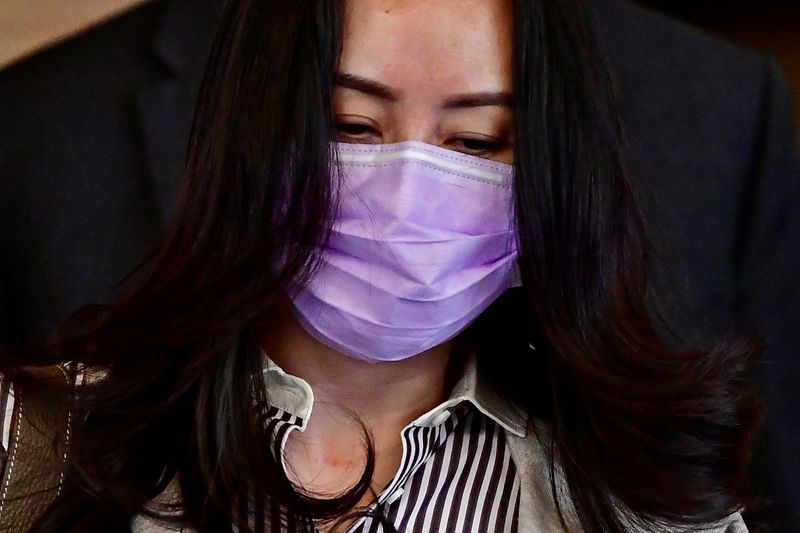By Tessa Vikander and Moira Warburton
VANCOUVER/TORONTO (Reuters) - The Canadian police officer who arrested a Huawei executive in Vancouver in 2018 told a court on Monday the apprehension was done by the book, amid claims by her lawyers that her rights were violated during the process.
Huawei Chief Financial Officer Meng Wanzhou arrived in the British Columbia Supreme Court on Monday for the first of five days of hearings as her U.S. extradition case resumed.
This week's hearings will focus on abuse of process committed by Canadian and U.S. authorities during her December 2018 arrest at Vancouver International Airport, as alleged by her lawyers. The case has intensified diplomatic tensions between China and the two North American nations.
Meng, 48, is charged by the United States with bank fraud for allegedly misleading HSBC about Huawei's [HWT.UL] business dealings in Iran, causing the bank to break U.S. sanction laws.
She denies the charges and is fighting extradition from under house arrest in Vancouver.
Meng's lawyers have argued that Canadian authorities improperly communicated with their U.S. counterparts, including allegedly sharing identifying details about her electronic devices.
Canada has denied this and provided affidavits from members of the federal Royal Canadian Mounted Police (RCMP) who were involved in Meng's arrest.
Meng arrived in court wearing a black sparkly cardigan, knitted blue top and grey skirt, accompanied by her translator as she came face to face with Winston Yep, a RCMP officer who arrested her nearly two years ago.
Meng's lawyers have alleged that authorities used the Canada Border Services Agency (CBSA) and its powers to search passengers to investigate Meng in a way that violated her rights.
Government lawyer John Gibb-Carsley asked Yep why, as the arresting officer, he didn't board the plane once Meng had landed. Yep said that because the airport is within the CBSA's jurisdiction it was decided that the CBSA would do its work first.
Yep said "there was no concern" about this process and added other passengers on the plane created a potential risk of violence if they made the arrest on the aircraft.
Meng's team has asserted that the CBSA inappropriately seized her electronic devices and that identifying information was shared with U.S. authorities.
Yep said the RCMP asked the CBSA to seize Meng's devices on a request from the United States and to put them in Faraday bags, which prevent data from being erased.
He added the request was "part of the process" and presented no cause for concern.
Gibb-Carsley asked whether Yep's supervisor expressed concern about the CBSA investigating before the RCMP.
"No," Yep said, adding that his supervisor was concerned Meng might elude CBSA and escape the airport, a concern that Yep shared.
However, Huawei lawyer Richard Peck said Yep's concern about potential violence on the plane was disingenuous and that as trained officers, the RCMP should have been able to arrest Meng there.
Peck also described Yep’s written notes from the day as "very sparse" and drew attention to the fact that Yep had not written a chronological report of the day, as required by Canada's extradition laws.
Calling live witnesses in an extradition case is "very, very unusual," said Leo Adler, a Toronto-based extradition lawyer, particularly if both sides will be able to cross-examine. Adler is not involved with the case.
Meng's team was able to do that based on documents released to them, Adler said, another aspect that is rare in extradition cases.
Meng's case, which is expected to last years, has strained relations between Ottawa and Beijing. Soon after her detention, China arrested Canadian citizens Michael Spavor and Michael Kovrig on espionage charges.
Hearings are scheduled to wrap up in April 2021.

(This story was refiled to add dropped word in introduction)
